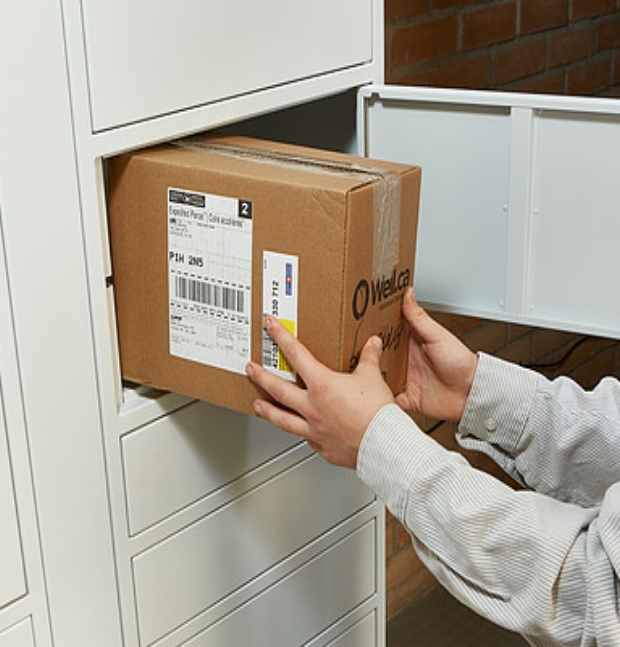With many regions across Canada in the throes of a second lockdown and the holiday season now in full swing, multi-residential property managers are facing a surge in parcel deliveries driven by a huge increase in online purchasing. For the e-commerce sector, this is something to celebrate. But for resource-strapped landlords ill-equipped to manage the daily deluge of incoming groceries and Amazon shipments, it means more strife, additional administration, and potentially unsafe conditions for residents.
As Joe Hoffer of Cohen Highley LLP points out, online shopping isn’t anything new, but the pandemic has accelerated the trend by way of store closures and strict measures to keep people physically distanced. According to Statistics Canada, e-commerce revenues increased 110 per cent between May 2019 and May 2020—and that’s well before “Black Friday” sales and holiday gift guides augmented the consumer appetite.
“By now, most landlords have instituted a policy, making it clear that tenants are responsible to arrange for pick-up of their parcels, and that parcels should not be delivered to their units, but rather, left at the entranceway or in the lobby,” Hoffer says. “If a landlord has no policy, then that landlord is at risk of liability for theft, loss, and other damages.”
In other words, a parcel delivery policy is something no landlord should be without.
Randy Daiter, Vice President, Residential Properties, at M&R Holdings, says his company instituted an updated version of its original policy early in the pandemic, when safety and infection control became utmost priorities. “Given the importance of practicing physical distancing and reducing external traffic flow into our buildings, we asked that our residents continue to pick up their deliveries and packages outside the building whenever possible,” he says. “It’s the resident’s responsibility to make arrangements for the retrieval of their deliveries. However, for residents with medical or mobility issues, or for those who are self-isolating, alternative arrangements can be made.”
That, according to Hoffer, is an important Human Rights Code consideration. “If a tenant has serious mobility issues and is unable to comply with a policy requiring them to pick up packages at a drop-off area in the lobby, then the landlord is obliged to ensure there is a means to accommodate the tenant’s needs,” he explains.
A good policy should also address liability, making it clear—in bold letters, says Hoffer—that the landlord shall not be responsible for lost or stolen parcels and that the risk of such lies entirely with the tenant. Additionally, the policy should address that, “In cases of breaches of the FPPA, or bylaws, or the Fire Safety Plan, where violations of the policy are observed, steps to enforce compliance will be taken.”
Smart solutions for all seasons
While the holidays tend to bring in the most parcel deliveries of the seasons, it is unlikely we’ll see an end to the online shopping trend anytime soon. The December gift-buying rush will transition into January returns, and undoubtably e-commerce will continue to prove itself as a safe, reliable and efficient way of procuring goods, as the world awaits a vaccine. But even then, the trend will continue.
To keep up with the flow of deliveries, many multi-residential buildings have begun to invest in “smart locker systems” like Canadian-made Snaile. The automated locker system uses infrared light sensors to detect when a package has been inserted into a locker, at which point a notification is sent by text message or e-mail to alert the recipient of the delivery. Working in reverse, users can insert packages into their locker and let carriers know that they’re ready for pickup.
The process is clean, simple, touchless, and removes the involvement of building staff—not to mention the unsightly dumping of parcels at entranceways that could lead to trip and falls.
 “The Snaile locker system allow parcel recipients a contactless pick-up of their deliveries, at their own convenient time without involving any staff or requirement to leave the building,” says Patrick Armstrong, CEO. “Developers, landlords, and REITS have always been early adopters of our tech, but the pandemic has pushed condos way up. Now that parcels are everywhere, the problem is very evident and getting bigger.”
“The Snaile locker system allow parcel recipients a contactless pick-up of their deliveries, at their own convenient time without involving any staff or requirement to leave the building,” says Patrick Armstrong, CEO. “Developers, landlords, and REITS have always been early adopters of our tech, but the pandemic has pushed condos way up. Now that parcels are everywhere, the problem is very evident and getting bigger.”
For older buildings with limited space, the solution may not be ideal, but most new builds are incorporating automated locker systems into their designs. Another plus for Snaile lockers is that they are accessible by a number of major carriers, including FedEx, Purolator, DHL and Intelcom, one of Amazon’s largest package delivery services in Canada.







